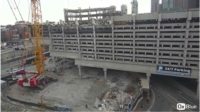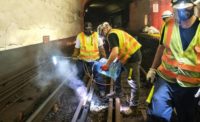Following a series of high-profile accidents, the Massachusetts Bay Transportation Authority (MBTA) will attempt to cram five years worth of repairs and upgrades into a single month with an unprecedented shutdown of an entire Boston-area subway line.
The agency will shut down all service on the Orange Line from Aug. 19 at 9 p.m. until Sept. 19, when trains would resume for the Monday morning commute.
During that time, contractors and crews will repair and replace tracks, while also upgrading signals and the ability to transfer trains from one track to another.
The dramatic announcement comes as MBTA undergoes an intensive review of its operations by the Federal Transit Administration after a long series of accidents and mishaps on system subway lines.
In the latest incident, a fire halted an Orange Line train ton a bridge over the Mystic River, prompting passengers to break windows to escape, with one jumping into the river and swimming to shore.
In another tragic accident, a Red Line rider was dragged to his death in April when his arm became caught in the door of a subway car as he was exiting.
“It will be the longest service diversion overseen ... for an entire line … replacing what would have taken five full years of weekend and evening diversions,” said Gov. Charlie Baker (R) at a press conference on Aug. 3.
A key part of the project will be replacing or upgrading 3,500 ft of 38-year-old track on the line. The work on the rails, in turn, will enable the MBTA to get rid of speed restrictions that currently cause trains to slow down near Jackson Square, Tufts, Haymarket and other locations, said Steve Poftak, MBTA general manager.
“This is an unprecedented service diversion for the MBTA,” he told reporters during the press conference with Baker. “We have never shut down an entire line in this way in order to make sweeping improvements."
The transit agency will also upgrade signals at Oak Grove from analog to digital, while creating a crossover area at Wellington to ease movement of trains onto different tracks.
MBTA also plans to move onto the tracks a new and modern Orange Line fleet after long delays by the Springfield plant in charge of building rail cars.
Poftak said the aim was to combine a number of projects that would have otherwise taken years in the space of a month.
The agency said it has done several shutdowns over the years of portions of various lines to accelerate work, with solid results. “We know this method works,” Baker said.
To plug the month-long gap in Orange Line service for hundreds of thousands of commuters, MBTA is turning to commuter rail, which services some of the same stops, while arranging for as many as 200 shuttle buses to transport passengers.
FTA is expected to issue a report on the MBTA later this month, with the condition of tracks a major issue the agency has already noted.
“The T was underfunded as we know for decades” and “still faces a number of significant challenges,” Baker said.






Post a comment to this article
Report Abusive Comment